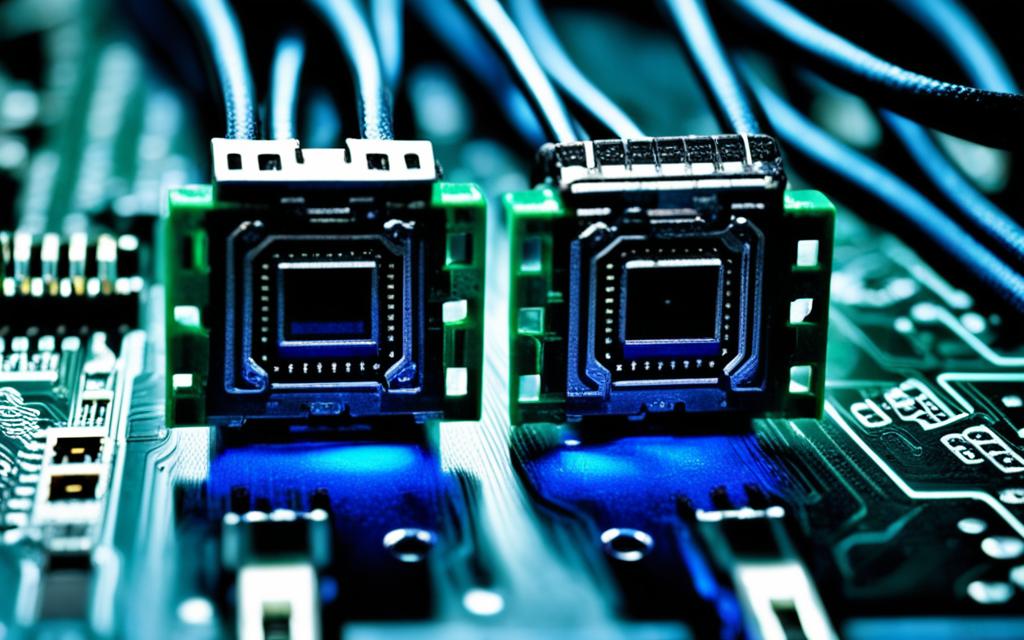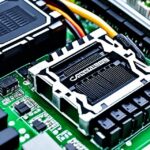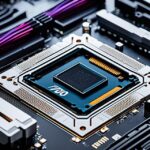Table of Contents
When tuning your computer for better performance, you might wonder if you need both 8-pin CPU power connectors. Modern motherboards, such as the ASRock B550 Pro4, come with dual 8-pin connectors. They are vital for power-hungry CPUs. Utilising both connectors improves your computer’s power delivery. This is necessary for high-end use and overclocking1.
CPUs may need anywhere from 60 to over 250 watts. It’s key to check if your power supply matches this need2. A properly set up system runs smoothly, avoiding power issues.
Key Takeaways
- Both 8-pin connectors enhance power delivery for high-performance CPUs.
- Using both connectors can provide improved stability, especially during overclocking.
- CPUs may draw varying amounts of power, underscoring the importance of adequate connectors.
- Consult your motherboard manual for optimal power connector configurations.
- Single 8-pin connections may suffice for regular usage but can limit performance under high loads.
- Upgrading your power supply can prevent power failures and instability.
Understanding the Role of 8-Pin CPU Power Connectors
The 8-pin EPS12V connector is key to a computer’s performance. It can deliver up to 336 watts to power-hungry CPUs. These are often found in gaming and computational tasks. Modern CPUs may need more power than one connector can supply. Thus, some motherboards have two connectors. This ensures enough power, especially with several GPUs in the system3.
The Function of 8-Pin Connectors in Power Supply
These connectors help make the power supply more stable and functional. For example, an Intel Core i9-13900k might need 253 watts at its peak. Just one connector could lead to voltage issues that affect the whole system. With an 8-pin and a 4-pin setup, up to 504 watts can be supplied. This allows smooth power distribution for different needs3.Learning about connecting options is useful for optimal setup.
Why Some Motherboards Feature Dual Connectors
Some motherboards have dual 8-pin CPU connectors to support high-end CPUs. These systems might need more power for upgrades or to run multiple graphics cards. The extra connectors ensure that power is evenly distributed4. Splitting the power helps to avoid overheating and keeps the system stable, following the manufacturer’s recommendations.
Do I Need Both 8-Pin CPU Power Connectors?
When you’re looking into 8-pin CPU power connectors, you should think about your CPU’s needs and how much power your system uses. Knowing the CPU power requirements helps decide if you need both connectors.
General Requirements for Most CPUs
Most CPUs work well with only one 8-pin connector. This is fine if you’re not overclocking your system. An 8-pin connector gives up to 384 watts. That’s a lot more than the 192 watts from a 4-pin. For basic uses, this is usually enough, so two connectors aren’t always needed.
High Performance and Overclocking Considerations
But, when you’re aiming for high performance or overclocking, things change. For example, an Intel Core i9-13900k might use up to 253 watts at its highest. This shows how power use can jump up fast3. Using both 8-pin connectors is a good idea for those pushing their systems hard. It ensures full turbo power support and better stability2.
Certainly, CPUs like the EPYC 7313p need between 100-150W. This highlights the importance of dual connectors for heavier loads2. In the end, having both connectors is best for overclocking or using demanding applications.
Evaluating Your Power Supply Unit (PSU)
Starting your PC build needs a careful look at the power supply evaluation. A good PSU ensures your computer runs smoothly and reliably. Checking if your PSU has single vs dual outputs is key. This is crucial for high-end parts.
Assessing Single vs Dual 8-Pin Outputs
A PSU with dual outputs spreads power better, ensuring smooth running during intense use. For powerful CPUs, two connectors bring more stability, important under big workloads. A single connector might not be enough. Modern motherboards and CPUs do better with dual connectors. This helps avoid power issues or crashes5. Not having the right connector could make your CPU slow, hurting performance6.
Understanding Power Ratings and Stability
Knowing your PSU’s power rating is vital for a serious setup. Most systems work well with 650W to 750W. But, this depends on what parts you have. High-rated PSUs, like those in the 80 PLUS program, are more efficient and stable. For setups with multiple GPUs or overclocking, a powerful supply and checking amperage is key7. Also, making sure your PSU uses thick wires, like 16AWG, improves stability. This prevents problems when your system is under load7.
Implications of Using Only One Connector
Using just one CPU power connector can lead to stability issues. A single connection might not supply enough power under heavy load. This can cause performance problems, system crashes, or unexpected shutdowns, especially during important tasks8.Understanding your setup’s implications is crucial to avoid these issues.
Potential Risks of Stability Issues
Nowadays, CPUs need both an 8-pin and either a 4-pin or another 8-pin for reliable power. Only using one connector might not just slow performance but also lead to stability issues during demanding tasks. High-end CPUs require more power due to their extra cores and faster speeds. This need can’t be met by a single connector, highlighting the importance of using two connectors9.
How Voltage Drops Affect CPU Performance
Risks also include voltage drops caused by bad wiring or connections. Using both 8-pin connectors helps spread the electrical load. This approach prevents big drops in voltage that can badly impact CPU performance. It’s especially vital during intense tasks like gaming or overclocking8. Upgrading to a better power supply with the right connectors is a smart move to boost efficiency8.
FAQ
Do I need both 8-pin CPU power connectors for my setup?
High-performance CPUs, especially if you’re overclocking, need both 8-pin connectors. They provide stable power. For standard CPUs, one connector is often enough.
What is the function of the 8-pin EPS12V connector?
The 8-pin EPS12V connector powers the CPU. It’s rated for 300W. For high wattage CPUs or many GPUs, two connectors are crucial.
Why do some motherboards have dual 8-pin connectors?
Dual 8-pin connectors on motherboards support powerful CPUs needing more power. It helps in distributing power well in intense gaming or creating content.
How can I evaluate my Power Supply Unit (PSU) for dual 8-pin outputs?
To check a PSU for dual 8-pin outputs, look at its specs. Dual outputs ensure stable, well-distributed power for high-demand systems at peak times.
What are the risks of using only one CPU power connector?
Using one CPU power connector may cause instability with heavy use. You might see voltage drops and inconsistent performance. The risk increases with overclocking.
How do voltage drops impact CPU performance?
Voltage drops can make the CPU work poorly. This leads to throttling, crashes, or sudden shutdowns. Using both 8-pin connectors helps avoid these problems.
Are there specific CPU models that benefit from dual 8-pin connectors?
Definitely, some CPUs like the EPYC 7313p require a lot of power for big tasks. Dual 8-pin connectors keep them running smoothly without power issues.
Source Links
- https://forum.asrock.com/forum_posts.asp?TID=26047&title=question-on-12v-power-connections-b550-pro4 – Question on 12v power connections B550 Pro4
- https://forum.level1techs.com/t/why-are-there-two-8-pin-cpu-connectors-on-my-board/204234 – Why are there two 8-pin CPU connectors on my board?
- https://www.makeuseof.com/why-your-motherboard-has-cpu-power-1-cpu-power-2/ – Why Your Motherboard Has CPU Power 1 and CPU Power 2
- https://www.makeuseof.com/power-connectors-motherboard-cpu-require/ – What Power Connectors Do a Motherboard and a CPU Require?
- https://ms.codes/blogs/computer-hardware/do-i-need-both-cpu-power-connectors – Do I Need Both CPU Power Connectors
- https://ms.codes/en-ca/blogs/computer-hardware/power-supply-doesn-t-have-8-pin-for-cpu – Power Supply Doesn’t Have 8 Pin For CPU
- https://pcper.com/pcper-article/choose-right-power-supply-pc/ – How to Choose the Right Power Supply for Your PC – PC Perspective
- https://www.techpowerup.com/forums/threads/quick-q-do-i-need-to-connect-1-or-both-cpu-cables-from-my-rm850x-to-my-z690-gaming-x-motherboard.297542/ – Quick Q: Do i need to connect 1 or both cpu cables from my RM850x to my Z690 Gaming X motherboard?
- https://softwareg.com.au/blogs/computer-hardware/do-i-need-both-cpu-power-connectors – Do I Need Both CPU Power Connectors








